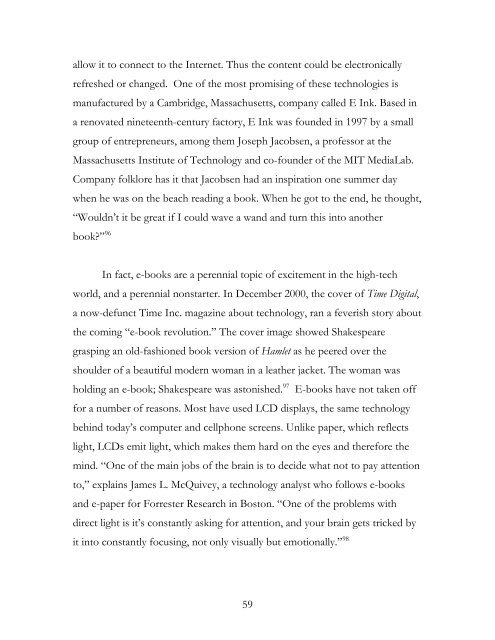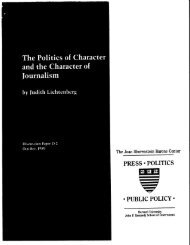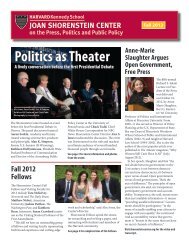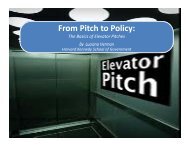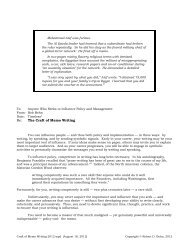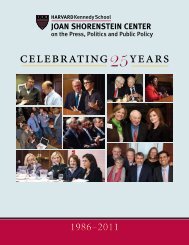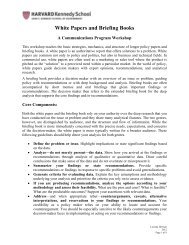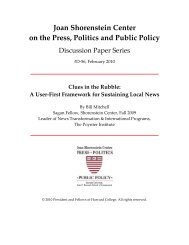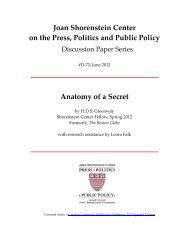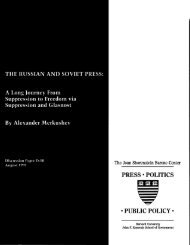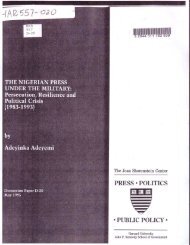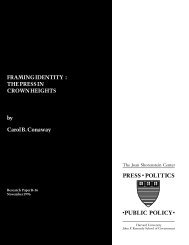Why Paper Is Eternal - Joan Shorenstein Center on the Press ...
Why Paper Is Eternal - Joan Shorenstein Center on the Press ...
Why Paper Is Eternal - Joan Shorenstein Center on the Press ...
Create successful ePaper yourself
Turn your PDF publications into a flip-book with our unique Google optimized e-Paper software.
allow it to c<strong>on</strong>nect to <strong>the</strong> Internet. Thus <strong>the</strong> c<strong>on</strong>tent could be electr<strong>on</strong>ically<br />
refreshed or changed. One of <strong>the</strong> most promising of <strong>the</strong>se technologies is<br />
manufactured by a Cambridge, Massachusetts, company called E Ink. Based in<br />
a renovated nineteenth-century factory, E Ink was founded in 1997 by a small<br />
group of entrepreneurs, am<strong>on</strong>g <strong>the</strong>m Joseph Jacobsen, a professor at <strong>the</strong><br />
Massachusetts Institute of Technology and co-founder of <strong>the</strong> MIT MediaLab.<br />
Company folklore has it that Jacobsen had an inspirati<strong>on</strong> <strong>on</strong>e summer day<br />
when he was <strong>on</strong> <strong>the</strong> beach reading a book. When he got to <strong>the</strong> end, he thought,<br />
“Wouldn’t it be great if I could wave a wand and turn this into ano<strong>the</strong>r<br />
book?” 96<br />
In fact, e-books are a perennial topic of excitement in <strong>the</strong> high-tech<br />
world, and a perennial n<strong>on</strong>starter. In December 2000, <strong>the</strong> cover of Time Digital,<br />
a now-defunct Time Inc. magazine about technology, ran a feverish story about<br />
<strong>the</strong> coming “e-book revoluti<strong>on</strong>.” The cover image showed Shakespeare<br />
grasping an old-fashi<strong>on</strong>ed book versi<strong>on</strong> of Hamlet as he peered over <strong>the</strong><br />
shoulder of a beautiful modern woman in a lea<strong>the</strong>r jacket. The woman was<br />
holding an e-book; Shakespeare was ast<strong>on</strong>ished. 97 E-books have not taken off<br />
for a number of reas<strong>on</strong>s. Most have used LCD displays, <strong>the</strong> same technology<br />
behind today’s computer and cellph<strong>on</strong>e screens. Unlike paper, which reflects<br />
light, LCDs emit light, which makes <strong>the</strong>m hard <strong>on</strong> <strong>the</strong> eyes and <strong>the</strong>refore <strong>the</strong><br />
mind. “One of <strong>the</strong> main jobs of <strong>the</strong> brain is to decide what not to pay attenti<strong>on</strong><br />
to,” explains James L. McQuivey, a technology analyst who follows e-books<br />
and e-paper for Forrester Research in Bost<strong>on</strong>. “One of <strong>the</strong> problems with<br />
direct light is it’s c<strong>on</strong>stantly asking for attenti<strong>on</strong>, and your brain gets tricked by<br />
it into c<strong>on</strong>stantly focusing, not <strong>on</strong>ly visually but emoti<strong>on</strong>ally.” 98<br />
59


